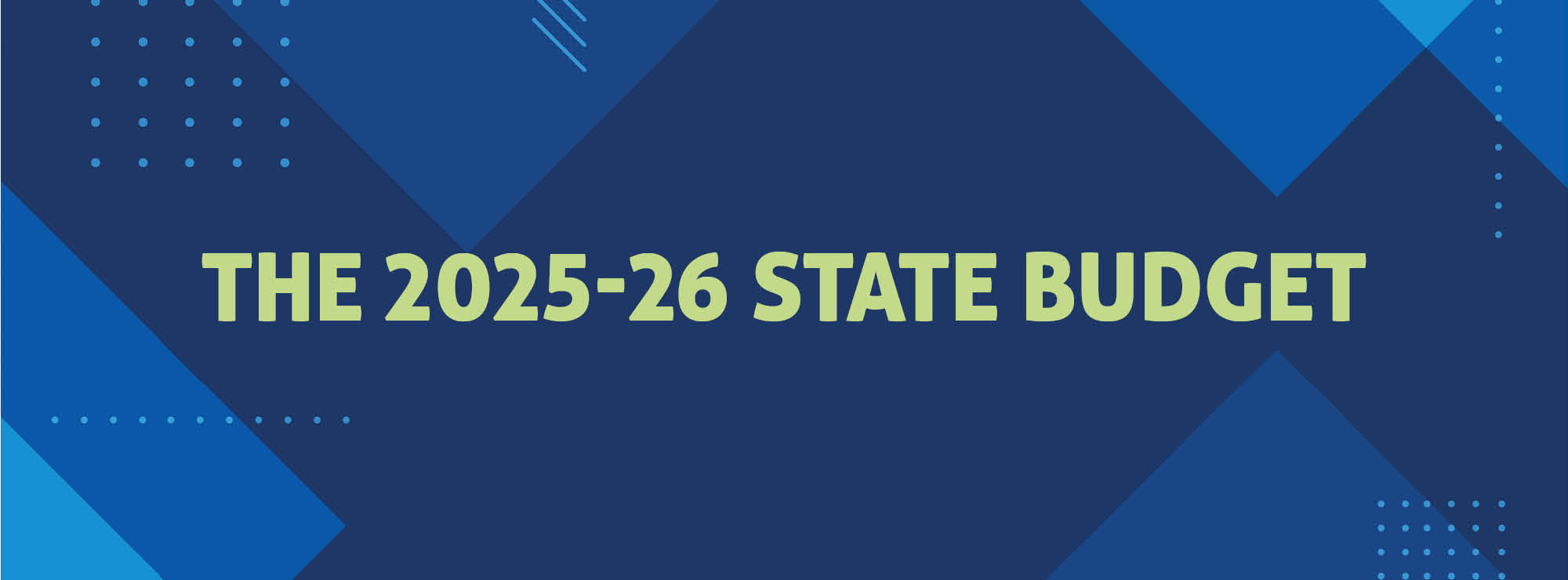The 2025-26 State Budget
The budget finally passed on May 8th, after several prolonged weeks of negotiation.While we did not get everything we were fighting for, there are some very big wins in this budget, including Universal School Meals and paying off our entire federal COVID loan for Unemployment Insurance Benefits. I’m going to highlight some of the major wins here but will be happy to answer specific questions via email or phone call to our office.
OVERVIEW:
Supporting Families and Putting Money Back In Your Pocket:
Funding Students and Schools
Helping Small Businesses and Unemployed Workers
Funding Environmental Priorities
Keeping New Yorkers Healthy
“The Best of the Rest”
Supporting Families and Putting Money Back In Your Pocket:
To begin, we are putting money back in the pockets of New York Families. We enhanced the Empire Child Tax Credit by increasing the maximum credit to $1,000 for children under 4 and $500 for children ages 4-16. This will result in $800B in tax relief for our families.
We also phase in a new $1B tax cut for low- and middle-income families (earning less than $323,000 in 2026). In addition, we will be issuing inflation refund checks to return surplus sales tax revenue to the taxpayer. Single earners with income up to $75,000 will receive $200, and those making between $75,000 and $150,000 will receive $150. Those filing jointly with income up to $150,000 will receive $400, and those making between $150,000 and $300,000 will receive $300.
We also simplified the Enhanced STAR application to align it with the federal application and clarified that only 1 member of the household need be 65 to qualify for Enhanced STAR.
We also launch a BABY benefit pregnancy allowance program, which provides an $1,800 lump-sum cash benefit to pregnant mothers who are currently receiving public benefits to help defray the costs of new babies. We also invest $1.5M for our Diaper Banks and $2.2B in childcare subsidies for lower- and middle-income families.
Funding Students and Schools
This is the first year of our new Foundation Aid formula, which gives greater funding to schools with more English Language Learners and low-income students, and also provides a 2% minimum across-the-board inflation increase to all schools. Overall, we allocated $37.6B in funding to our public schools, representing a $1.7B increase over last year. $26.4B of that is Foundation Aid, a $1.4B increase over last year.
We are happy to announce the adoption of a truly Universal Free School meal program.Any school that participates in the federal free lunch program will qualify for free school breakfast and lunch for every student, regardless of income level.
One of the issues that caused a delay in the budget was negotiations over a bell-to-bell cell phone ban.Schools are now directed to institute a ban on cell phone or other internet-enabled personal devices in K-12 schools across the state.Each school district can make their own policy about how to enforce that ban, but the plan must be in place by August 2025.
As we approach the 2027 requirement that new school bus purchases be all zero-emission, we have created a waiver program that allows schools who, through no fault of their own, are unable to meet that deadline.Schools who struggle to purchase buses due to power supply shortages, actual bus shortages, or other infrastructure challenges can apply for up to two consecutive, 24-month waivers, to allow them time to meet the requirement.
This is a little wonky, but it’s huge news for BOCES-- we increase the aidable salary for BOCEs instructors from $30,000 to $60,000, which will help us retain and hire many important faculty positions for our career and technical education (CTE) programing.
Speaking of CTE-- I am thrilled to announce that a bill I have carried for several years, (A1088), which provides funding to begin CTE education in 9th and 10th grade, is included in the budget! This is very important to help expose more students to the opportunities available in the trades, healthcare and technology, that don't require a college degree.
In higher education news, we made substantial allocations to CUNY and SUNY for capital improvements, including critical investments in SUNY Upstate and Downstate Hospitals. We also provide $47M to the new “New York Opportunity Promise Scholarship” which will provide financial support for tuition, books, and fees for students ages 25-55 enrolled in specific high demand fields at SUNY and CUNY community colleges.
Helping Small Businesses and Unemployed Workers
During the COVID-19 pandemic, more than a million New Yorkers lost their jobs at no fault of their own, causing us to use roughly 30 years’ worth of unemployment benefits in one year. As a result, we were forced to take out a $10B loan from the Federal Government that is required to be paid back by employers. This year, we allocated $8B to pay back that debt. Not only does this alleviate a major burden on our small businesses who saw huge increases in their unemployment insurance rates, but it allows us to finally increase the unemployment rate, which we are required to do by law but can’t if we have an outstanding debt.
I have carried the bill to increase this amount from the 2019 rate of $540 to $869 and I am proud to report that this increase was made as part of the budget.
Funding Environmental Priorities
We fund the Environmental Protection Fund in the amount of $425M to continue existing environmental programming and projects through the DEC and other local entities.We also include a new $1B for the Sustainable Future Program, which will fund projects across the state to reduce emissions and invest in sustainable infrastructure, particularly in disadvantaged communities. We maintain the Clean Water Infrastructure Act at $500M which helps us with water infrastructure, including helping fund lead line replacement.
Keeping New Yorkers Healthy
Health is the single largest portion of our state budget with Medicaid representing the bulk of that allocation. This year we secured $500M for the distressed hospital fund. We provided $30M for nursing home and hospice rate increases. We spend $7M on maternal health and $1M to the nurse-family partnership, among many other spending priorities.
On the policy end we expand Medicaid to include infertility treatment for cancer patients to allow them to preserve their ability to bear children. We also eliminate the antiquated requirement to issue pregnancy loss notifications for abortions-- still births and miscarriages will continue to be issued certificates.
I would be remiss if I did not take this moment to talk about what we did not get done. While we provide funding for our nursing homes, it is yet again not enough. We did not address the crisis in EMS, despite the Governor's budget and both one-house budgets both featuring a provision to finally designate this life-saving care as an essential service. We provide only a 1/3 of the cost of living increase our DSPs were asking for, which was even less than they actually deserve. We do not provide additional funding for Early Intervention Services, which were in our Assembly one-house.
While I recognize the challenges and uncertainty the potential cuts at the federal level present for Medicaid funding, it is a dishonor and a disservice to New Yorkers who rely on this care, and the hardworking people who deliver it, to not provide funding to these critically under-served and vulnerable sectors of our healthcare system.
The Best of the Rest
We make some big investments in mental health, including $8M for a Daniel’s Law pilot program so communities can develop and implement behavioral health crisis response systems to respond to individuals in crisis.
We also provide funding for the JEDS program, which helps divert youth offenders into supportive services and greatly reduces the youth recidivism rate.
We have some huge consumer protection wins, including:
- Requiring artificial intelligence (AI) companions to alert users that they are not communicating with a human, and to follow a protocol if users express suicidal ideation or self-harm;
- Mandating clear return and refund policies from online retailers and retail stores;
- Requiring subscription services to allow you to cancel in the same manner that you signed up—known as the “Click to Cancel” provision;
- Demanding businesses disclose when they are using a dynamic pricing model
- $2.5 million in funding for the Public Utility Law Project to provide representation to low-income consumers in utility related matters.
We provide an additional $100 million over two years in the Consolidated Local Street and Highway Improvement Program (CHIPS), which funds our road maintenance program.
We also provide $150M in critical funding to the Department of Corrections for additional personnel, as well as $535M for costs associated with stabilizing the system. We also allocate $400M for fixed camera installations in DOCCS facilities and $18.4M for body-worn cameras for correctional officers. We provide $7.2M for 81 additional full-time positions and form a new special investigations office.
The budget is a very large, complex set of ten bills. I tried to hit on the issues we receive the most questions and advocacy about, but again, I am more than happy to help you identify certain funding lines if you have more specific questions.
Now it’s time to get to work on our legislative agenda!
